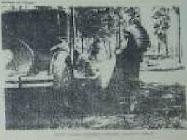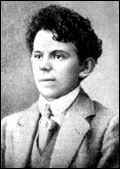There is a dimension in poetry which Ron, for all his genealogical & antiquarian research, knowledge, & passion, just does not get. & I know my own b-b-b-b-log is tedious with Ron-demurrals. Nevertheless I want to say it, just like I want to say, as an aside, that Louis Menand (in his essay in this week's New Yorker on the sociology of literature & prize-giving) does not get it, on a certain level.
What's wrong with Menand's very familiar thesis? The age-old mistake of the fore-brained philosophical proseur : to confuse the woman's dress & make-up with her physical beauty. Menand pretends to reduce art to power, commerce & good old ordinary human venality (how enlightened, how sophisticated, how worldly-wise, how regular-guy!). He forgets that the retail of literary commerce is rooted in the wholesale of aesthetic beauty; that the insane ego-trips, kultur-trips, money-trips & power-trips, which distort every human social interaction, don't actually touch or influence the formal elements of beauty (which are untouchable because formal - because rooted in nature) - elements that both the craft-work and the inspired genius of art are bound to emulate & reiterate.
& what do I want to say, again, about Ronville Sillimanville? What is it he doesn't get?
Ron reduces poetic history to a squabble between competing "schools". Essentially, this is a rationalization : a reduction of something which is more accurately, if more vaguely, termed "tradition".
Poetic tradition is ecumenical and welcoming : that is, membership is open to individuals from nowhere, everywhere. Yet once in the door, tradition is extremely demanding.
How so? Well, you cannot become part of the tradition by joining a school or a trend. In order to become part of the one great global tradition of poetry, you have to make poems. And poems are made with inspired poetic genius, gift, talent : because without these powers, the attainment of the particular order & beauty which inheres in poems is impossible.
Poetic beauty is so dense with articulate sensible conceptual order - like the synthesis of a coherent dream, raised to the nth degree - that its accomplishment is not available to the human will.
The literary theorizing which subjects poets & poems to the discourse of schoolish rivalries is similar to the Marxist narrow-mindedness which channels human industry & commerce into its particular video fantasy-battle between Good & Evil. That is, the model is inadequate to the complexity of the truth.
The poet is dedicated to the service of beauty; his or her productions bear witness to that dedication. This is not a board game to be judged by tyro-hobbyists.
12.23.2005
Labels:
aesthetics,
Louis Menand,
poetic schools,
Ron Silliman,
social role,
theory,
tradition
Subscribe to:
Post Comments (Atom)



No comments:
Post a Comment